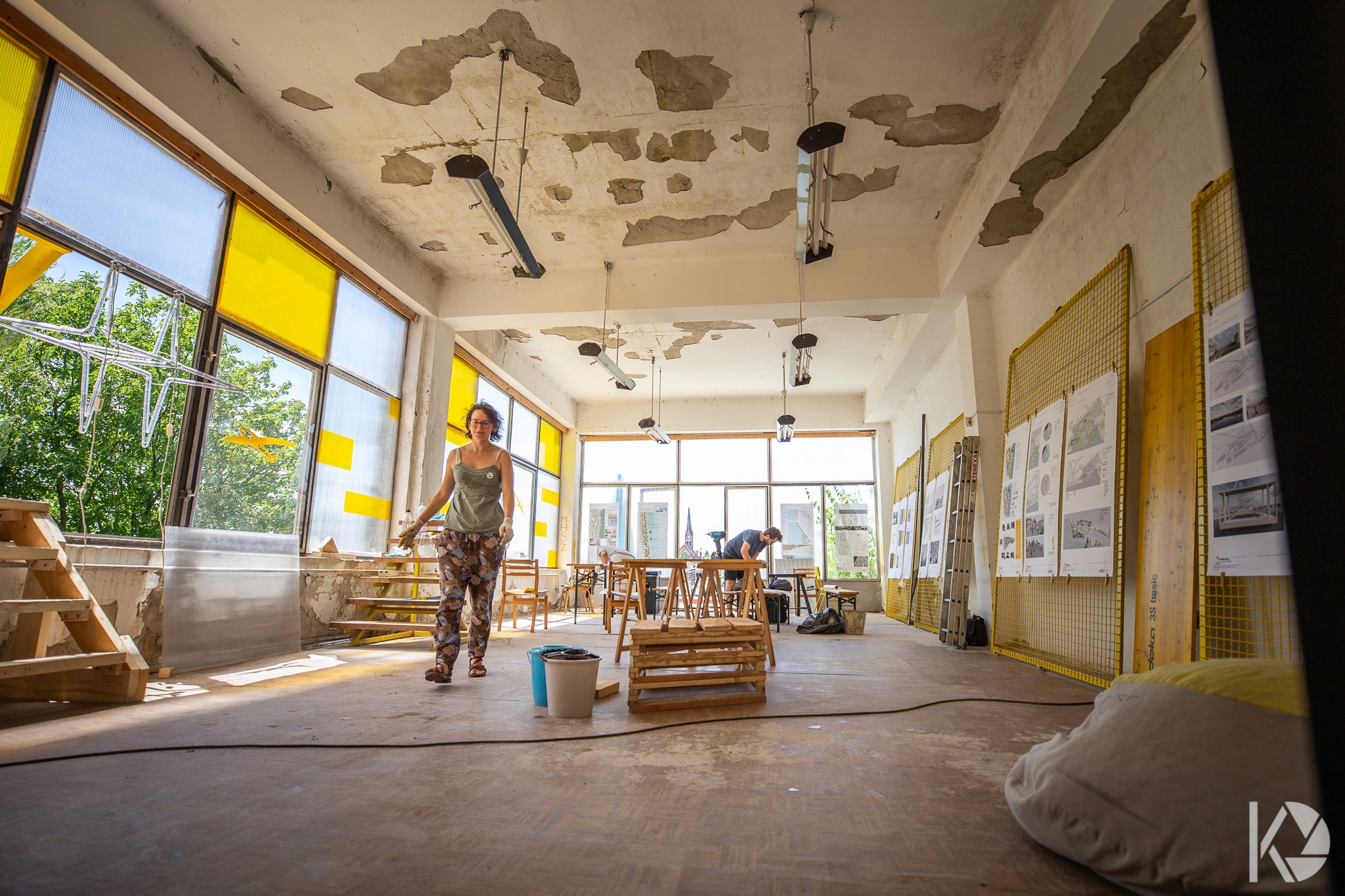Study trip to the Czech festival Film and Architecture in Prague 2024
10/11/2024
The organising team for the 2024 Budapest Architecture Film Days (Léna Kovács, Bálint Köves, Tibor Kuklis, Réka Lantos Puskás Levente, Bernát Mezei) participated in the Prague film days from September 28. to October 3. Besides watching films, there was ample time to attend satellite programmes and get to know the life in Prague.
After attending the 2024 Budapest Architecture Film Days, the staff of the Contemporary Architecture Centre were invited by the organisers of the autumn Prague Architecture Festival and Film Days (Sabina Ježková, Vacláv Ševčík, Marcela Steinbachová). The 2024 Prague Film a Architektura festival explores and showcases the relationship between film and architecture. The series of events was not only of particular significance from a professional perspective but also offered an excellent opportunity for building international relationships and professional exchanges.
Since we primarily considered our trip to Prague as a study visit, we were looking for films to be presented at the 2025 Budapest festival while also attempting to observe the methods of the foreign organising team. During the festival, we watched films that are directly related to the world of architecture and present modern architectural practice from various approaches.
Without claiming to be exhaustive, we would highlight the following film (the festival started before the weekend): The Architects of Hope addressed the architectural possibilities and challenges in post-war Ukraine from the perspective of sustainable and humane design. The film not only discusses the projects of practising local architects but also showcases Ukrainian architecture students, striving to overcome battles, who are making innovative contributions - so far theoretically - to the country's reconstruction.
Liam Young: Speculative Architecture is a speculative approach to future cities and ways of life, where the merging of technology and architecture takes centre stage. This block consisted of a series of short films, alternating with each other, or often appearing as collages of live-action and rendered scenes, giving a unique flavour to the films' visual world. The short films transcended the boundaries of architecture, often focusing on the tension between humans and technology, while at other times merely visualising dystopian cities at Prague's CAMP (which could be considered the Czech Centre for Contemporary Architecture).
Architecton documents architectural creativity and experimentation, seeking new ways in designing contemporary urban spaces, a slower paced creation full of beautiful scenes. Concrete Time explores the relationship between time and the built environment, focusing on the long-term impacts of human activity. Skopje's earthquake-following brutalist architecture initially shone as a result of nationwide reconstruction, but today we just see abandoned raw concrete masses. The film elaborates on the path that led here. After the screening, we explored the Czech National Gallery.
DEPOT – Reflecting Boijmans documents the design and construction process of the Depot Boijmans Van Beuningen museum building in Rotterdam. The film presents the key players in the design and construction with objective, pinpoint accuracy and details. At the same time, it highlights the relationship and collaboration between the lead designer of MVRDV and the museum director, adding a highly comical touch to the film.
Architecture CSSR 58-89 is a comprehensive documentary that examines the architectural heritage of the Czechoslovak Socialist Republic and the political context of the era. The film, which often presents familiar moments to Hungarian viewers, is extremely concise and thorough. It represents a very high standard in terms of filmic tools and architectural historical research, and numerous interviews with architects and co-designers further elevate the quality. Scenes from a Memory is also a documentary bouquet, presenting the intertwining of the built environment and collective memory, discussing the significance of personal and community spaces. During the screening of a film introducing the lives of Far-Eastern communities, there was an additional plus as the director connected via a short video message during the screening.
The festival offered numerous satellite programmes: right upon arrival on September 28, we participated in a walk primarily targeting the housing estates of Prague's suburbs. After the tourist-attracting city centre, it was a real refreshment, especially for the experienced architect's eyes. The next day, Sunday, was followed by a meet-and-greet brunch among the directors, providing an excellent opportunity to personally meet the festival organisers and members of the international directing team. At this event, we presented the work, goals, and future projects of the Contemporary Architecture Centre to the Czech organisers and the international professional audience. The event was particularly useful for building new professional contacts and establishing potential collaborations. Furthermore, the Hungarian delegation organised numerous individual cultural programmes for themselves (TV tower, Unknown Soldier Memorial, visit to U Zlatého tygra, etc.).
In a special opportunity, with the help of Dutch director Sonia Herman Dolz, we visited the Prague Designblok festival on Monday, which is one of Central Europe's most significant design and architecture events. At the festival, we personally met Winy Maas, leading designer of MVRDV, and listened to his lecture. Maas's lecture provided deep insights into innovative approaches in contemporary urban planning. Besides the exhibition, it was solemnly announced that MVRDV is to design the new Prague airport buildings.
Our participation in the 2024 Prague film festival was extremely successful both professionally and in terms of networking. The festival provided us with an opportunity to gain deeper insights into international architectural trends and various aspects of the intersection between film and architecture. We found numerous inspirations for organising the 2025 Budapest Architecture Film Days (e.g., a simplified foldable pamphlet instead of last year's stitched booklet, director's login before films, organiser's T-shirt, etc.).
The experiences and connections gained at the event contribute to further strengthening our institute's role in domestic and international architectural discourse.



